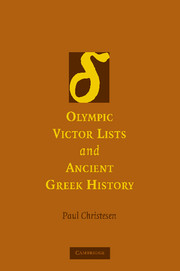Book contents
- Frontmatter
- Contents
- List of Illustrations
- List of Tables
- Preface
- A Note on Terminology, Transliterations, and Editions
- 1 An Introduction to Olympic Victor Lists
- 2 Hippias of Elis and the First Olympic Victor List
- 3 Olympionikon Anagraphai and Standard Catalogs of Olympic Victors
- 4 Olympiad Chronographies
- 5 Olympiad Chronicles
- 6 Conclusion
- Appendices
- 1.1 Scopas
- 1.2 Tiberius Claudius Polybius
- 1.3 Aristodemus of Elis
- 2 Hippias of Elis
- 3.1 Aristotle's Olympionikon Anagraphe
- 3.2 Eratosthenes' Olympionikon Anagraphe
- 3.3 The Aristotelian Pythionikai
- 3.4 POxy II 222
- 3.5 IG II2 2326
- 4.1 The Eusebian Olympic Victor List
- 4.2 Timaeus of Tauromenium
- 4.3 Dionysius of Halicarnassus
- 5.1 Philochorus
- 5.2 Ctesicles
- 5.3 Diodorus Siculus
- 5.4 Castor of Rhodes
- 5.5 Dionysius of Halicarnassus
- 5.6 Thallus
- 5.7 Phlegon
- 5.8 POxy XVII 2082
- 5.9 POxy I 12
- 5.10 Cassius Longinus
- 5.11 Dexippus
- 6 A Catalog of Olympic Victors Before Hippias?
- 7 Aristotle on the Foundation of the Olympic Truce and of the Olympic Games
- 8 Olympiads and Pankration Victors in Thucydides
- 9 More on the Accuracy of Hippias' Olympic Victor Catalog
- 10 The Olympic Victor List and the First Messenian War
- 11 Memorization and the olympic victor list
- 12 Hippias' Calculation of the Date of 776
- 13 The Spartan King Lists
- 14 Variant Olympiad Dating Systems
- 15 Menaechmus of Sicyon's Pythikos
- 16 The Sicyonian Anagraphe
- 17 Relationships between Olympionikai
- Bibliography
- General Index
- Index Locorum
8 - Olympiads and Pankration Victors in Thucydides
Published online by Cambridge University Press: 23 November 2009
- Frontmatter
- Contents
- List of Illustrations
- List of Tables
- Preface
- A Note on Terminology, Transliterations, and Editions
- 1 An Introduction to Olympic Victor Lists
- 2 Hippias of Elis and the First Olympic Victor List
- 3 Olympionikon Anagraphai and Standard Catalogs of Olympic Victors
- 4 Olympiad Chronographies
- 5 Olympiad Chronicles
- 6 Conclusion
- Appendices
- 1.1 Scopas
- 1.2 Tiberius Claudius Polybius
- 1.3 Aristodemus of Elis
- 2 Hippias of Elis
- 3.1 Aristotle's Olympionikon Anagraphe
- 3.2 Eratosthenes' Olympionikon Anagraphe
- 3.3 The Aristotelian Pythionikai
- 3.4 POxy II 222
- 3.5 IG II2 2326
- 4.1 The Eusebian Olympic Victor List
- 4.2 Timaeus of Tauromenium
- 4.3 Dionysius of Halicarnassus
- 5.1 Philochorus
- 5.2 Ctesicles
- 5.3 Diodorus Siculus
- 5.4 Castor of Rhodes
- 5.5 Dionysius of Halicarnassus
- 5.6 Thallus
- 5.7 Phlegon
- 5.8 POxy XVII 2082
- 5.9 POxy I 12
- 5.10 Cassius Longinus
- 5.11 Dexippus
- 6 A Catalog of Olympic Victors Before Hippias?
- 7 Aristotle on the Foundation of the Olympic Truce and of the Olympic Games
- 8 Olympiads and Pankration Victors in Thucydides
- 9 More on the Accuracy of Hippias' Olympic Victor Catalog
- 10 The Olympic Victor List and the First Messenian War
- 11 Memorization and the olympic victor list
- 12 Hippias' Calculation of the Date of 776
- 13 The Spartan King Lists
- 14 Variant Olympiad Dating Systems
- 15 Menaechmus of Sicyon's Pythikos
- 16 The Sicyonian Anagraphe
- 17 Relationships between Olympionikai
- Bibliography
- General Index
- Index Locorum
Summary
Thucydides twice uses the name of an Olympic victor to identify a specific Olympiad. In both cases the victors are pancratiasts. Some scholars have taken this as evidence for an early tradition of using pankration victors as eponyms for Olympiads. It seems clear, however, that in the two instances in which Thucydides wished to specify particular Olympiads, he did so by naming the most famous victor at the Olympiad in question. Both victors, by coincidence, happened to be pancratiasts.
At 3.8.1 Thucydides describes a meeting held at Olympia between representatives of the Mytilenians and of the Peloponnesian League:
The envoys of the Mytilenians … since the Lacedaemonians told them to come to Olympia so that the other allies might hear them and take counsel, arrived at Olympia. This was the Olympiad in which Dorieus of Rhodes won for the second time.
At 5.49.1 Thucydides discusses the exclusion of the Spartans from Olympia:
The Olympic Games were held during this summer, in which Androsthenes of Arcadia won the pankration for the first time. The Lacedaemonians were excluded from the sanctuary by the Eleans with the result that they could neither sacrifice nor compete. This was because they did not pay the fine that the Eleans imposed upon them in accordance with Olympic law. The Eleans charged them with attacking the fortifications at Phyrcos and with sending their hoplites to Lepreon during the Olympic truce.
- Type
- Chapter
- Information
- Olympic Victor Lists and Ancient Greek History , pp. 468 - 474Publisher: Cambridge University PressPrint publication year: 2007



